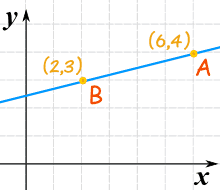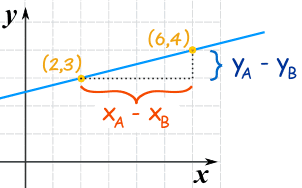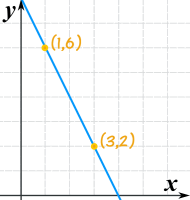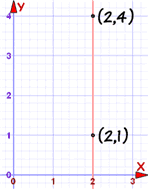How To Find An Equation With Two Points
Equation of a Line from 2 Points
Starting time, let's see it in activeness. Hither are 2 points (you can drag them) and the equation of the line through them. Explanations follow.
The Points
Nosotros use Cartesian Coordinates to mark a point on a graph by how far along and how far up it is:

Example: The point (12,5) is 12 units along, and five units up
Steps
There are 3 steps to find the Equation of the Straight Line :
- 1. Find the slope of the line
- ii. Put the slope and i point into the "Point-Slope Formula"
- 3. Simplify
Footstep 1: Find the Slope (or Gradient) from two Points
What is the gradient (or gradient) of this line?

We know ii points:
- point "A" is (six,4) (at x is 6, y is iv)
- bespeak "B" is (ii,iii) (at 10 is 2, y is 3)
The slope is the modify in height divided by the modify in horizontal distance.
Looking at this diagram ...

Gradient m = alter in y alter in x = yA − yB tenA − tenB
In other words, nosotros:
- subtract the Y values,
- subtract the X values
- then carve up
Like this:
one thousand = change in y change in x = four−3 half dozen−ii = 1 4 = 0.25
It doesn't thing which betoken comes outset, it notwithstanding works out the same. Try swapping the points:
m = change in y change in x = 3−4 2−6 = −1 −4 = 0.25
Aforementioned reply.
Step ii: The "Signal-Gradient Formula"
Now put that slope and 1 betoken into the "Point-Gradient Formula"

Start with the "signal-slope" formula ( ten1 and y1 are the coordinates of a betoken on the line):
y − y1 = yard(x − tenone)
We can cull whatever point on the line for xone and yi , and so let'south merely utilise point (two,3):
y − 3 = m(x − ii)
We already calculated the gradient "k":
m = alter in y change in x = iv−3 half dozen−2 = i 4
And we have:
y − 3 = one 4 (x − 2)
That is an answer, only we can simplify it further.
Stride 3: Simplify
Starting time with: y − 3 = i 4 (x − 2)
Multiply 1 four and (x−two): y − three = x 4 − 2 4
Add 3 to both sides: y = ten 4 − 2 iv + iii
Simplify: y = x four + v ii
And we become:
y = 10 4 + 5 two
Which is now in the Slope-Intercept (y = mx + b) class.
Check Information technology!
Permit united states of america confirm by testing with the second bespeak (6,four):
y = x/four + 5/two = 6/4 + two.5 = 1.five + 2.5 = four
Yes, when 10=6 then y=four, and then it works!
Another Instance
Case: What is the equation of this line?

Kickoff with the "point-slope" formula:
y − y1 = m(x − tenane)
Put in these values:
- 10ane = 1
- y1 = 6
- k = (two−vi)/(three−1) = −4/ii = −2
And we become:
y − 6 = −two(x − 1)
Simplify to Slope-Intercept (y = mx + b) class:
y − 6 = −2x + 2
y = −2x + 8
DONE!
The Big Exception
The previous method works nicely except for ane item case: a vertical line:

A vertical line's gradient is undefined (because we cannot separate by 0):
m = yA − yB xA − 10B = 4 − i 2 − 2 = three 0 = undefined
But in that location is still a way of writing the equation: use ten= instead of y=, like this:
x = two
Source: https://www.mathsisfun.com/algebra/line-equation-2points.html
Posted by: fileralcull.blogspot.com


0 Response to "How To Find An Equation With Two Points"
Post a Comment